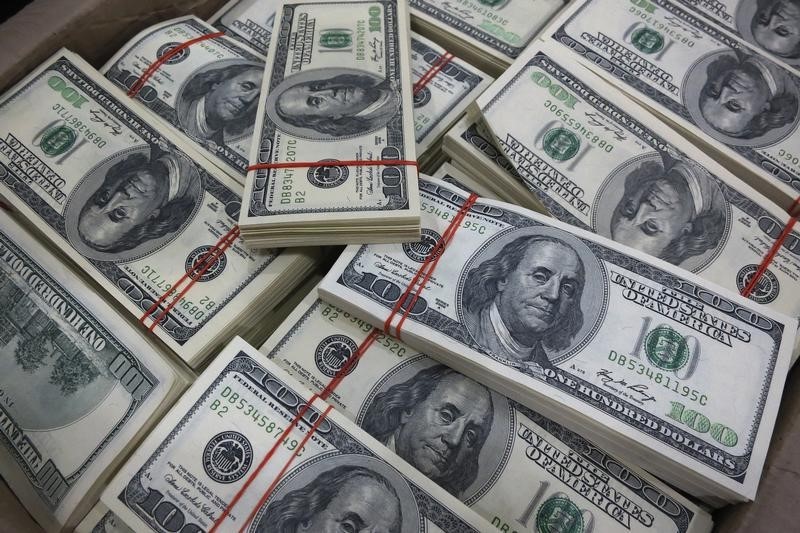Investing.com - The US dollar slipped back Friday, but remained on track for a strong weekly performance, boosted by expectations of a US economic outperformance and thus fewer Federal Reserve rate cuts this year.
The Dollar Index, which tracks the greenback against a basket of six other currencies, was last down 0.3% lower to 108.900, retreating after reaching a more than two-year high on Thursday.
Dollar remains strong
The index is on course for weekly gains of around 1%, which would be its best weekly performance in over a month, as traders continue to factor in a more hawkish Fed and a resilient US economy.
Manufacturing activity data in the US for December, as determined by S&P Global, came in stronger than expected on Thursday, setting the scene for the more widely-watched Institute for Supply Management's version due later in the session.
This is seen cooling slightly to 48.2 last month, down from a five-month high of 48.4 in November. It was the eighth consecutive month that the measure was below the 50-point threshold, although the number remained above a level of 42.5 that the ISM says indicates broader economic expansion.
Markets will also be looking ahead to the important monthly jobs report at the end of next week, with the next Fed meeting also due this month.
“Markets are fully expecting a hold in January,” said analysts at ING, in a note. “If indeed the dot plot works as a benchmark for rate expectations for the next three months, the bar for a data surprise to seriously threaten the dollar’s big rate advantage is set higher.”
Euro bounces, but faces hefty weekly decline
In Europe, EUR/USD edged 0.4% higher to 0.0042, rebounding somewhat after having tumbled almost 1% in the previous session to a more than two-year low.
The single currency was helped by the number of people out of work in Germany rising less than expected in December, according to data released Friday.
However, the euro was still headed for a weekly decline of around 1.5%, its worst since November after data released earlier Thursday showed that manufacturing activity in the eurozone declined at a faster rate at the end of 2024.
Traders expected more interest rate cuts from the European Central Bank in 2025, with markets pricing in at least 100 basis points of easing.
GBP/USD traded 0.3% higher to 1.2422, after sliding over 1% on Thursday, and on track to lose roughly 1.4% for the week.
The Bank of England held interest rates unchanged last month after consumer prices rose above target, and traders are expecting roughly 60 bps of cuts from the Bank of England in 2025.
Yuan slumps after PBOC rate cuts report
In Asia, USD/CNY rose 0.8% to 7.3587, with the pair climbing to its highest level since September 2023.
The Financial Times reported that the PBOC will cut interest rates further in 2025, as the central bank pivots to a more conventional monetary policy structure under a singular benchmark interest rate.
The monetary policy reform comes as a slew of liquidity measures have largely failed to stimulate China’s economy over the past two years.
USD/JPY traded 0.1% lower to 157.31, after hitting an over five-month high in late-December on the back of a mostly dovish outlook for 2025 from the Bank of Japan.
